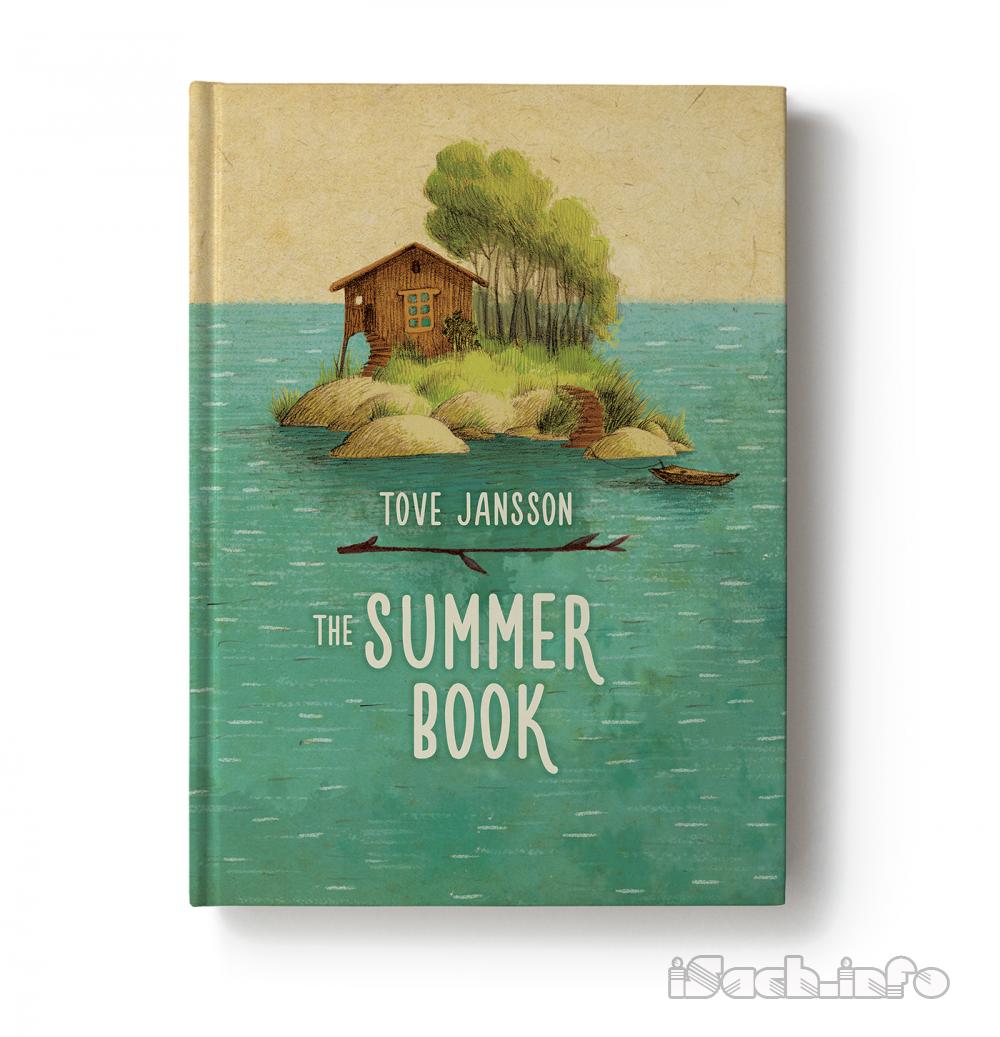Chapter 8: Dead Calm
T
HE SEA is very rarely so calm that a small boat with an outboard motor will venture out to The Cairn. The Cairn is the last island out in the Gulf of Finland. It takes hours to get there, and you have to take food for the entire day. The Cairn is a long skerry, and from a distance it looks like two islands, two smooth spines with a channel marker on one of them and a little beacon on the other. There is no cairn on the island at all. When you get closer, you can see that the granite spines are as sleek as seals and that there is a long thin neck of boulders between them. The boulders are perfectly round:The sea was as smooth as oil, and so pale you could hardly tell it was blue. Grandmother sat in the middle of the boat under a violet parasol. She hated violet, but it was all they had. Moreover, it was really a pretty color, as clear and bright as the sea itself. The parasol made them look like the worst kind of summer people, which they were not. When they reached The Cairn, they went ashore at the first spot they came to, since there was no lee side—in the calm all sides were lee. They carried their things ashore and put the butter in the shade. The granite was hot underfoot. Papa wedged the handle of the parasol into a crack—Grandmother was to lie there on an air mattress and enjoy herself. She watched them set off in opposite directions; the island was so large that pretty soon they turned into little dots moving along the edge of the water. Then she crawled out from under the parasol and took her walking stick and headed off in a third direction of her own, but before she left she arranged some sweaters and bathrobes on the mattress so it would look as though she were asleep.
Grandmother came down to the shore at an interesting spot where a little canyon cut through the rock and ran out into the sea. Even now, at midday, the bottom of this canyon was in shadow—right down into the water and a long way out, like a crevice of darkness. Grandmother sat down and edged into the canyon a little at a time until at last she dropped to the bottom and was all by herself in peace and quiet. She lit a cigarette and watched the barely visible swell. By and by, the boat appeared from behind the point. Papa was making a sweep around the reef to set out his nets.
“So there you are,” Sophia said. “I went swimming.”“How’s the water?” Grandmother said. From the bottom of the canyon, the child was a narrow shadow against the sun, like a stick of wood.
“Pretty bloody cold,” Sophia said, and jumped down into the canyon. The floor of the crevice was covered with stones, from the size of a person’s head down to the size of a marble. They found a place where the granite was full of those very small Finnish garnets you find sometimes, and they tried to dig them out with a jackknife. It didn’t work. It never does. They ate hard bread and watched the boat. All the nets were out, and it sailed back and disappeared around the point.
“You know, sometimes when everything’s fine, I think it’s just a bloody bore,” Sophia said.
“You do?” said Grandmother, taking out another cigarette. It was only her second before noon, and she always tried to smoke in secret when she could remember to.
“Nothing happens,” her grandchild explained. “I wanted to climb the channel marker and Papa said I couldn’t.”
“That’s too bad,” Grandmother said.
“No, it’s not ‘too bad,’” Sophia said. “It’s bloody stupid.”
“Where did you pick that up? You keep saying ‘bloody’ all the time.”
“I don’t know. It sounds neat.”
“Violet’s a bloody color,” Grandmother said. “Talk about ‘bloody’—did I ever tell you about the dead pig I found once? We boiled the meat off for a week and it stunk to heaven. Your father wanted to have the skeleton for school. You know, for zoology.”
“No,” said Sophia suspiciously. “What do you mean? What school?”
“When your father was little.”
“When? What pig? What did you say it was called?”
“Oh, nothing,” Grandmother said. “One time when your father was little, about your age.”
“He’s big,” the child said, and started cleaning the sand out from between her toes. They each fell silent. After a while, Grandmother said, “Right now he thinks I’m asleep under that umbrella.”
“But you’re not,” Sophia said. “You’re down here sneaking a cigarette.”They picked out stones that hadn’t been worn completely round and threw them out into the water to make them rounder. The sun moved on across the sky, and the boat came around the point and took up the nets and dropped them right back in again.
“The fishing’s bloody awful,” Grandmother said.
“Listen,” Sophia said. “I don’t have time to stay here with you—I’ve only been in swimming twice today. You won’t be sad now, will you?”
“I want to go too,” Grandmother said.
Sophia thought for a moment and said, “All right; you can come too. But only where I tell you.”
They helped each other climb out of the canyon, and then they circled around the hill so as not to be seen. Off to one side of the channel marker, there was a large, deep pool.
“Is this all right?” Sophia asked.
“It’s fine,” Grandmother said. She bared her legs and stuck them into the pool. The water was warm and pleasant. Some light brown muck swirled up to the surface, along with a swarm of tadpoles, but they quickly settled down again. She spread her toes and stuck her legs farther in. There was a big clump of loosestrife where the pool narrowed toward one end, and the granite was streaked with yellow sedum growing in the crevices. Papa had built a fire at the other end of the island, and the smoke rose straight up in the air.
“In all the years I’ve sailed around in these islands,” Grandmother said, “I don’t think it’s ever been this calm before. There was always some wind. He never went out unless there was a storm. We had a spritsail. He’d sail the boat and I’d keep watch for the spar markers in the dark. I hardly had time—‘north spar,’ I’d say, and then ‘west spar’—they went by so fast. And one time when the rudder came loose...”
“You fixed it with a hairpin,” Sophia said.
Grandmother swished her legs in the pool and didn’t say anything.
“Or maybe it was a safety pin,” Sophia went on. “Some days I can’t remember exactly. But who was he?”
“Your grandfather, of course,” Grandmother said. “My husband.”
“Are you married?” Sophia cried in great astonishment.“Bloody nitwit,” Grandmother muttered to herself. Out loud she said, “You better ask your father about generations and all that. Ask him to draw it on a piece of paper. If you’re interested.”
“I don’t think so,” said Sophia amiably. “I’m kind of busy right now.”
The channel marker was a high wall of well-spaced, horizontal planks, like a section of picket fence turned on end. It was painted white, with a red triangle in the middle. The distance from one plank to the next was so great that Sophia’s legs just barely reached, and after each step her knees began to shake—not much, just enough so that she had to wait until they stopped. Then came the next rung. Sophia had made it almost to the top before Grandmother saw her. Grandmother realized right away that she mustn’t scream. She would have to wait for the child to come back down. It wasn’t dangerous. Children have a lot of ape in them: they’re good climbers and never fall unless they’re startled.
Sophia was climbing very slowly now, with long pauses between steps, and Grandmother could see she was scared. The old woman stood up too quickly. Her walking stick rolled down into the pool, and the whole rock became an uncertain, hostile surface, arching and twisting in front of her. Sophia took one more step.
“You’re doing fine,” Grandmother called. “You’re almost there!”
Sophia took another step. She got her hands over the topmost plank and didn’t move.
“Now come back down,” Grandmother said.
But the child didn’t move. It was so hot in the sun that the channel marker shimmered and quaked in waves.
“Sophia!” Grandmother called. “My stick fell down in the pool and I can’t walk.” She waited and then called again. “It’s bloody awful, do you hear me? My balance is bloody awful today, and I’ve got to have my cane!”
Sophia started down. She moved steadily, one step at a time.
Damned child, Grandmother thought. Confounded children. But that’s what happens when people won’t let you do anything fun. The people who are old enough.
Sophia was back down on the rock. She waded out into the pool for the stick and handed it to Grandmother without looking at her.“You’re a very good climber,” said Grandmother sternly. “And brave, too, because I could see you were scared. Shall I tell him about it? Or shouldn’t I?”
Sophia shrugged one shoulder and looked at her grandmother. “I guess maybe not,” she said. “But you can tell it on your deathbed so it doesn’t go to waste.”
“That’s a bloody good idea,” Grandmother said. She walked off across the rock and sat down beside the air mattress, just outside the shade of the violet parasol.



 ePub
ePub A4
A4